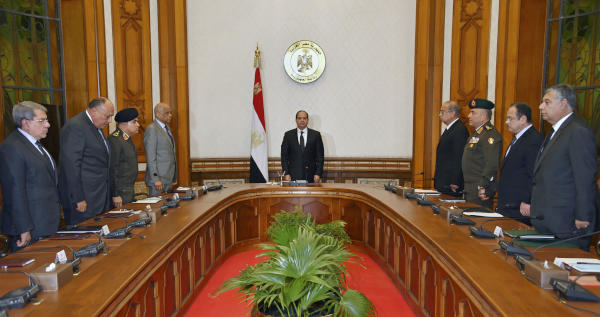Egypt declared on Monday a three-month state of emergency a day after two ISIS-claimed church bombings killed at least 44 people as they celebrated Palm Sunday mass.
The cabinet said the state of emergency would go into force from 1 p.m. (1100 GMT) on Monday. The nationwide measure must be approved by parliament within seven days to remain in place.
“The armed forces and police forces will do what is necessary to confront the threats of terrorism and its financing in order to maintain security across the country, protect public and private property and the lives of citizens,” a cabinet statement said.
The state of emergency was announced on Sunday in a televised address by President Abdel Fattah al-Sisi following the church attacks. He also ordered troops immediately deployed to assist police in securing vital facilities, saying that “Egyptians have foiled plots and efforts by countries and fascist, terrorist organizations that tried to control Egypt.”
The emergency decree will give the security forces wide-ranging powers. Ending martial law was one of the demands of the popular uprising that ousted President Hosni Mubarak in 2011.
According to Egypt’s constitution, it cannot exceed six months.
The first Sunday bombing at the Mar Girgis church in Tanta city north of Cairo killed 27 people, the health ministry said. The second struck outside Saint Mark’s church in Alexandria, killing 17 people after a suicide bomber was prevented from entering the building.
The victims were laid to rest on Sunday and Monday.
Scores more were wounded in the latest in a string of extremist-linked attacks on Egypt’s Coptic community.
Lawmakers said the state of emergency — Egypt’s first since widespread unrest in 2013 — would help the country face down a menacing extremist insurgency.
It will allow police to detain for 45 days suspects “known to the security services but for whom there is not enough evidence to go to trial,” said parliament member Yehia Kedwani.
ISIS has been waging a deadly insurgency in the Sinai Peninsula and has claimed scores of attacks on security forces there.
But it has been unable to seize population centers, unlike its early gains in Iraq and Syria, and it has also lost top militants to Egyptian military strikes in recent months.
Analysts say Sunday’s bombings suggest the group is lashing out as it finds itself under increasing pressure in other countries.
